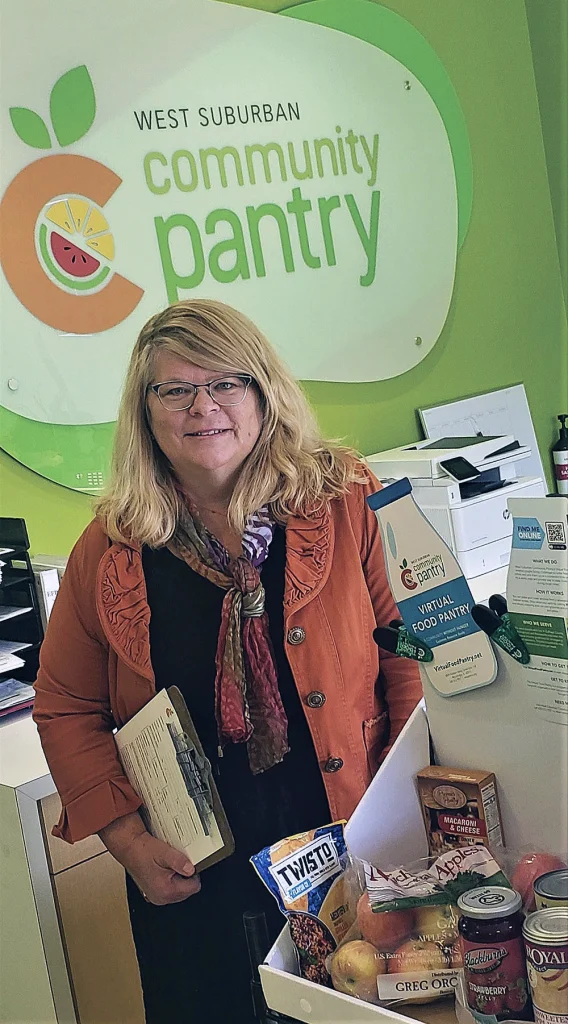Hungry to Help: breaking down barriers to food assistance

West Suburban Community Pantry’s Sue Armato, other staff, and volunteers break down barriers to food assistance in DuPage County and beyond
By Valerie Hardy
Last year, West Suburban Community Pantry provided approximately 3 million pounds of food to community members facing food insecurity. Located in Woodridge (6809 Hobson Valley Drive, Suite 118), the Pantry has been working toward its vision of “a community without hunger” since 1992.
“The West Suburban Food Pantry has a long, rich history in DuPage County,” the Pantry’s Chief Executive Officer, Sue Armato, said.
It originated in 1970, when a group of parishioners – led by Roger and Barbara Schmith – from St. Scholastica in Woodridge came together to create a small emergency food pantry in a closet at their church. The need for food within the community grew beyond what the church closet space could accommodate, and in 1992, what came to be titled Woodridge Community Pantry was incorporated as a 501(c)(3) nonprofit organization. This expansion allowed the Pantry to serve a greater population from throughout DuPage County.
As the nonprofit grew in size and support, so did its leaders’ awareness of the need for accessible food supply for people in surrounding counties. In 2010, the Pantry adopted its current name to reflect its availability to offer aid to residents of Will County in addition to those in DuPage County. Most recently, the Pantry’s clientele was documented as 66 percent DuPage County households, 30 percent Will County households, and the remainder from other local counties.
While the Pantry’s location, name, and geographic service area changed over the years and services – such as school breakfast programs – were added, one thing has stayed the same: no one is turned away.
Armato, whose family lived below the poverty level when she was growing up, personally knows the importance of having access to food and other critical supports. “My family needed access to food pantries and used the free lunch program,” she said. “We needed all the help we could get.”
Customers come for food and leave with so much more than a shopping cart full of food; they also leave with hope.”
-Sue Armato, CEO of West Suburban Community Pantry
Rooted in her own experiences with food insecurity along with an unceasing desire to eradicate hunger within the community, Armato is committed to continuing West Suburban Community Pantry’s longstanding compassionate leadership as a “place to go for help and hope” for both individuals and families facing food insecurity. Armato truly empathizes with clients’ needs, and she understands the “powerful impact a pantry can have for a family, for a child.”
In 2023, West Suburban Community Pantry served 53 percent adults, 32 percent children, and 15 percent senior citizens, providing them with a wide array of produce, dairy, eggs, frozen meat, breads and other baked goods, and non-perishable items. However, equally important to providing for clients’ dietary needs, the Pantry also is committed to nourishing clients’ spirits. “West Suburban Community Pantry is that special place where customers come for food and leave with so much more than a shopping cart full of food; they also leave with hope, knowing that they are not alone,” Armato said. “We can see the comfort, the support, the hope, and being part of that type of life-changing work is very special.”
Yet such work can also be challenging. The need for accessible food supports is not subsiding, Armato explained. With rising grocery prices, community members are turning to resources like the Pantry at increasing rates.
The demand is highest in the late fall and early winter as “more people are trying to have adequate food and supports to manage through the holidays,” Armato said. Another peak time is when schools are closed for summer break and “children and families no longer have access to free and reduced lunches or weekend food backpacks,” she added.
Thankfully, the Pantry is ready to help, during these busiest times and always. The Pantry served over 110,000 people in fiscal year 2023, and its support services are expanding “to help address the underlying issues that cause someone to access [the] Pantry…with the hope to reduce other stressors and work to eliminate them with our customers so that they are in a stronger position and so they don’t need to come to a pantry anymore,” Armato explained.
However, the Pantry – though guided by an extremely dedicated administrative staff, board of directors, and advisory council – cannot continue the mission to alleviate hunger and contributing stressors alone. “Donations are the backbone to keeping the Pantry in a strong position to support so many of our neighbors and communities,” Armato said, and the Pantry is always seeking to add volunteers to the already solid foundation of nearly 100 regular volunteers.
For more information about West Suburban Community Pantry’s hours and services or ways to access services, volunteer, or make a donation, visit wscpantry.org.
